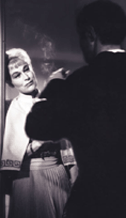Gertrud is an emotionally restrained, yet profoundly compelling portrait of a life without compromise. Gertrud (Nina Pens Rode) is a captivating, privileged woman married to a diligent professional, Gustav Kanning (Bendt Rothe). She is disillusioned with her marriage, believing that Gustav’s political ambitions impede his complete devotion to her. On the afternoon of Gustav’s impending appointment to the cabinet minister post, Gertrud confesses her infidelity, and asks for a divorce. Using the pretense of attending the opera, Gertrud leaves Gustav to meet her lover, a young pianist named Erland Janssen (Baard Owe), at a park. But is soon evident that Erland’s affection for Gertrud is also a frivolous whim, inspired more by the conquest of an unattainable woman of society than a union of souls. After declaring her complete love for him, Gertrud asks Erland to abstain from seeing a courtesan named Constance – a request, to which, he consents. During a banquet in honor of Gabriel Libman (Ebbe Rode), a romantic poet and former lover, Gertrud falls ill, and is visited by an old friend, Axel Nygren (Axel Strobye). Despite their comfortable intimacy and mutual affection, there is an absence of passion between them, once again, extinguishing any hope of finding ideal love. A pensive, disheartened Gabriel later visits Gertrud, recounting his experience with a crude young man, Erland Janssen, who boasted of his latest affair to the notorious courtesan. Gabriel expresses his consuming love for her, but is also spurned by Gertrud, citing his own careless words as a reflection of his true feelings: “A woman’s love and a man’s work are mortal enemies”. A heartbroken Gustav implores the defiant Gertrud to reconsider her decision, but is inevitably rejected.
Carl Theodor Dreyer continues to defy conventional cinematic language in his final film, Gertrud. Through long takes, static shots, and minimalist mise-en-scene, Dreyer creates an austere, visually spare atmosphere, reflecting Gertrud’s inflexibility and myopic determination in her search for ideal love. As in Ingmar Bergman’s The Silence, Dreyer uses mirrors and non-confrontational dialogue to create a pervasive atmosphere of emotional distance: Gertrud’s alienation from the career-minded Gustav; Erland’s emotional immaturity and evasive deception; Gabriel’s subconscious betrayal; Axel’s logical, dispassionate nature. Unable to find ideal love and rejecting all pretenses of illusory and fleeting love, Gertrud chooses an independent life, unwilling to settle for incomplete love. In the end, Gertrud withdraws to a hermetic existence, isolated from the distraction of society, preferring to resign herself to her lost memories.
© Acquarello 2000. All rights reserved.
